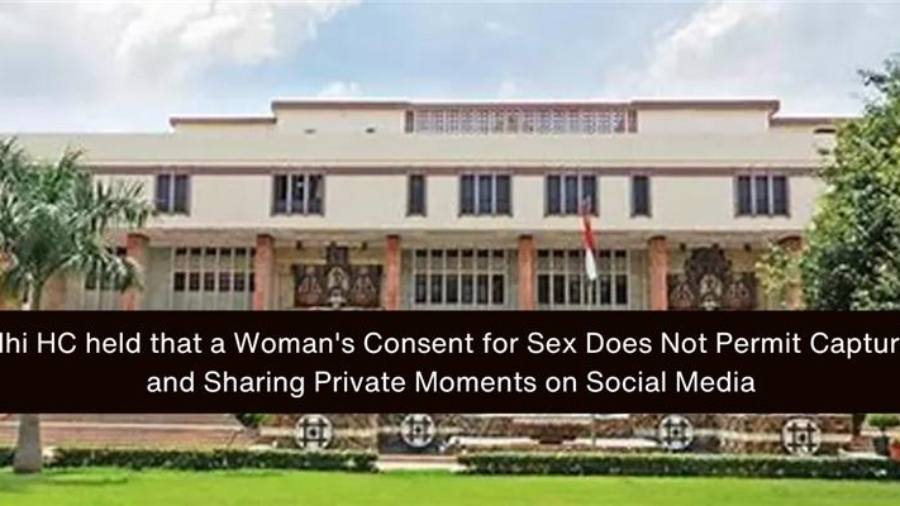Delhi HC held that a Woman’s Consent for Sex Does Not Permit Capturing and Sharing Private Moments on Social Media
Facts of the Case:
The present case concerns a bail application filed under Section 439 of the Cr.P.C. and Section 483 of the Bharatiya Nagarik Suraksha Sanhita, 2023, for the grant of regular bail. The applicant has been charged for offences punishable under Sections 376 and 506 of the Indian Penal Code (IPC). The complainant, a woman residing in Delhi since 2018 with her children, came in contact with the accused through her sister. The accused, a 26-year-old man working in Kuwait, began a relationship with the complainant, who had promised to repay ₹3.5 lakhs he gave her for a beautician course. The relationship turned manipulative as the accused allegedly blackmailed the complainant, forcing her into inappropriate video calls and later engaging in forced sexual relations under threat of releasing the videos. The accused also reportedly defamed her by sharing the videos on social media and sending them to people in her village. The complainant’s medical examination and her Section 164 statement corroborated these allegations. The accused was arrested on 20.01.2024.
Contentions of the Petitioner:
The applicant’s counsel argued that the allegations against the accused are vague and baseless, asserting that the relationship between the accused and the complainant had been one of friendship, which soured due to a financial dispute. The counsel presented a loan agreement as evidence to show that the money the complainant received was a loan, and thus, the complaint was false. The applicant’s counsel further noted that the accused had been in jail for almost a year, the FSL report was still pending, and the supplementary chargesheet had not been filed, with the trial expected to take a long time. Based on these factors, the applicant requested the court to grant bail.
Contentions of the Respondent:
The prosecution, represented by the learned APP, contended that the complainant’s statement under Section 164 of Cr.P.C. clearly depicted the accused’s actions of blackmailing the complainant, including capturing inappropriate videos of her without consent and later threatening her with their release. The prosecution emphasized that the accusations were grave and required thorough investigation, especially since the FSL report was still awaited. They argued that granting bail would undermine the severity of the offence and that the accused’s actions warranted his continued detention.
Court’s Observations:
The court analyzed the facts and the arguments presented by both sides. It observed that, according to the complainant’s statement and complaint, the accused had initiated a friendship under the pretense of offering financial assistance but had later exploited that trust for personal gain. The court highlighted that the loan arrangement presented by the defense did not justify the accused’s alleged exploitative behavior. The court also noted that even if the initial sexual relations had been consensual, the subsequent actions of the accused—namely the use of inappropriate videos to coerce and manipulate the complainant—were not consensual. The court rejected the defense’s argument that the complainant’s marital status could diminish the severity of the allegations, stating, “the attempt to weaponize the complainant’s marital status and professional background to diminish the gravity of the allegations is unacceptable.” Furthermore, the court emphasized the seriousness of the accusations, including the alleged involvement of the accused in uploading images of the complainant’s minor daughter on social media.
Court’s Order:
Considering the gravity of the allegations, the court determined that the accused’s actions were not merely a case of a failed friendship but rather a clear case of exploitation and blackmail. In light of these facts and the pending investigation, the court concluded that bail could not be granted at this stage. Therefore, the application for bail was dismissed. The court also instructed the Director of the Forensic Science Laboratory (FSL) to ensure that the report is provided to the Investigation Officer (I.O.) as soon as possible to avoid delays in the trial. The I.O. was directed to forward a copy of the order to the Director, FSL. The court clarified that nothing in the order should be construed as an opinion on the merits of the case.
Credits: Deeksha Rai


